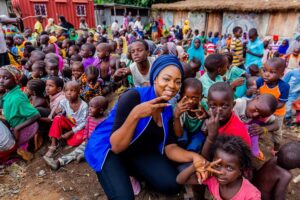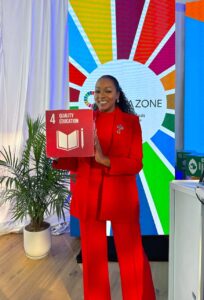Adress: 7 Edinburgh Road, Enugu, Nigeria

Q: Can you share a bit about your journey and the defining moments that shaped your vision for empowering African children and communities?
My journey has been profoundly influenced by a family deeply rooted in the values of service and compassion. Growing up, my parents instilled in my siblings and me the importance of giving back to humanity. Weekly visits to orphanages and underserved communities were a family tradition, where we not only shared food but also spent meaningful time with those in need. These experiences opened my eyes to the transformative power of kindness and connection, and from a young age, I knew I wanted to dedicate my life to making a difference. When the Rochas Foundation was established in 1998, I had the privilege of witnessing its incredible evolution—from a single school in Owerri, Imo State, to 13 schools in Nigeria impacting the lives of children across 25 African countries. Growing up volunteering with the foundation allowed me to see firsthand the life-changing impact of access to education. It also deepened my conviction about the potential of the African child and the critical role Africa plays on the global stage. This sense of duty continues to inspire and drive my efforts to empower African communities through education and advocacy.


Q: Education has been a cornerstone of the Rochas Foundation. What inspired you to focus on education as a tool for societal transformation?
Education is deeply personal to me because I have witnessed its transformative power—not just for individuals, but for entire families and communities. The Rochas Foundation was founded on the belief that educating one child can empower an entire generation. Education shapes thinkers, innovators, and leaders, laying the foundation for lasting societal transformation. From the first graduating class to date, we have seen remarkable stories of children who once had no hope for a brighter future becoming lawyers, doctors, IT specialists, politicians, artists, and more. These individuals have not only achieved personal success but have also uplifted their families and communities, breaking the cycle of poverty and inspiring countless others.
Q: What challenges have you faced in balancing your philanthropic and entrepreneurial pursuits, and how have they influenced your approach to leadership?
My entrepreneurial ventures in hospitality and real estate are intentionally designed to embody sophistication while fostering platforms for local talent and community empowerment. These businesses are a reflection of my core values: creativity, inclusivity, and excellence. Balancing the demands of entrepreneurship and philanthropy presents challenges, but I see them as inherently interconnected. These ventures not only create jobs but also align with my broader mission to uplift and empower communities. Over the years, I’ve prioritized building strong, purpose-driven teams and maintaining a clear focus on sustainable impact. I firmly believe that every endeavor—whether in business or philanthropy—should contribute meaningfully to improving lives, with people always at the center of my vision and efforts.
Q: Having strong ties to the Southeast, what do you think are the region’s greatest opportunities for economic advancement?
The Southeast is rich with potential. From agriculture to tech innovation, there are untapped opportunities that could drive economic growth. For me, it’s about creating environments where youth and businesses can thrive. Investing in infrastructure, supporting local entrepreneurs, and embracing new technologies are some of the keys to unlocking this potential. Finally, the region’s human capital—its talented and hardworking population—is its greatest asset. By fostering education, skill development, and entrepreneurship, the Southeast can drive sustainable growth and become a model of progress within the country and beyond.
Q: Africa’s youth represent its greatest potential. What do you see as the most critical areas for intervention to secure a brighter future for them, especially in the Southeast?
Africa’s youth population, currently over 60% of the continent’s 1.4 billion people, is the largest in the world, making it one of the continent’s most significant assets. In the Southeast and acros Africa, this demographic represents unparalleled potential for growth and transformation, but realizing this potential requires targeted interventions in critical areas. First, education and skill development are critical. Equipping young people with skills for emerging industries like technology and renewable energy will make them globally competitive. Second, job creation and entrepreneurship are vital. By providing funding, mentorship, and an enabling environment, we can empower youth to drive innovation and economic growth. Finally, bridging the digital divide and fostering leadership through mentorship programs will ensure young people have the tools and confidence to shape their future. With these interventions, Africa’s youth can become th engine of transformation and progress.
Q: Finally, as a woman leading across multiple sectors, what message would you share with young women aspiring to break barriers and redefine what’s possible?
To every young woman out there, my message is simple: believe in yourself, even when others don’t. Barriers are meant to be broken, and challenges are stepping stones. Surround yourself with mentors who inspire you, never stop learning, and always remember that you define what’ possible. Your dreams are valid, and your voice matters. Take your place at tables in every sector, and where no seats are available, create your own tables and uplift others to join you. The world needs your strength, ideas, and leadership—don’t be afraid to claim your space and redefin what’s possible